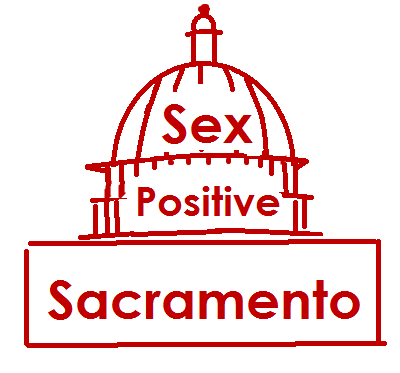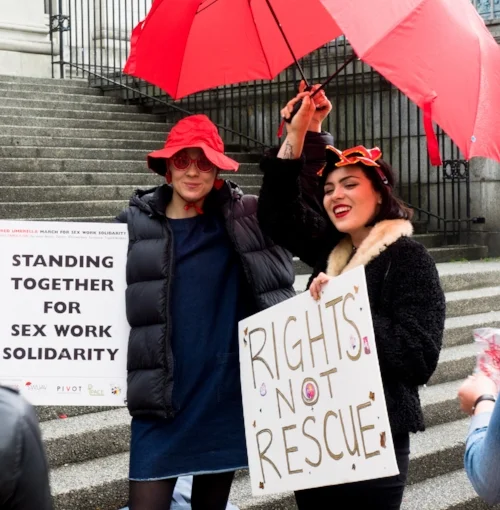By Heather Woodford, ASW
The Sex Positive Social Worker
Recently, Laura LeMoon published an article on what it’s like to be a sex worker working in the field of social work. LeMoon has worked in at least five social work positions – and has been either directly fired or edged out four of them as a result of being a sex worker. The piece offers a keen and cutting critique of the expert-driven, hierarchal model of mainstream social work, based around the idea of “saving” or “rescuing” clients - in particular, sex workers. This paradigm, LeMoon argues (and I agree) allows social workers to distance ourselves from our clients, retaining an air of superiority, even if not intentionally.
In my little corner of the world, LeMoon’s article caused a stir. I shared the piece with local social work networks, and on my own personal and professional Facebook page. One response I found particularly upsetting was a knee-jerk “how can they say that?!” reaction that smacked of “but not ALL social workers.”
Have we learned nothing from the #MeToo movement?
It matters little that not ALL social workers are explicitly unkind to sex workers, when we live in a whorephobic, sex work exclusionary society. If we agree on nothing else, can we agree that social problems - by definition - are systemic, political, and relational - not merely individual? That means that how we as a society treat social workers needs to be addressed at the individual, relational, agency, community and policy levels.
No one wants to feel like they – or their tribe – are being personally attacked. I understand the temptation to ask people to be patient or nice because it hurts our feelings to hear that they've had shitty experiences with mainstream social work - a profession that prides itself on its kindness and compassion. I get that we want to defend our profession, our colleagues, to protest, "but not ALL social workers!" However, I think this comes across as dismissive, arrogant, tone policing, and otherwise missing the point - not to mention, PERPETUATING the problem by refusing to actually address the issue. It's a form of gas lighting. It ignores the root causes of why and how sex workers are excluded and oppressed.
However, the point is that sex workers do not HAVE the luxury of standing in line to ask politely, ad infinitum, for their rights. They are marginalized, oppressed, murdered, driven out of systems that are supposed to provide for and protect people. With an arrest record, how does one get a job? With no document-able income how does one secure housing? With no access to banks (yes, sex workers routinely have their bank, credit, PayPal and other accounts deleted because of the nature of their work), how do they establish credit or participate in the economy in a “legitimate” way? With the risk of arrest, how can one call the police if they are raped, assaulted, or otherwise attacked on the job - or even off the job?
In its ideal form, social work should ALWAYS lead the way in progress toward greater justice for all, “with particular attention to the needs and empowerment of people who are vulnerable, oppressed, and living in poverty” (NASW 2017). My seven years of training and practice as a social worker has introduced me to many, many kind-hearted individuals with the best of intentions; but I have also observed (and participated in) a deeply flawed system that mirrors larger social, political, and economic issues of inequality. Social work, at is core, IS NOT and SHOULD NOT be a neutral profession. By nature of the fact that we exist in this society, in the words of Howard Zinn, “you can’t be neutral on a moving train.” This goes doubly so for professionals who operate under a Code of Ethics founded on social justice. sometimes, we find ourselves in positions that force us to choose between our boss' policies, and our professional ethics. For example, some social workers played a role in the internment of Japanese Americans during World War II.
Among our core social work values are service; valuing the inherent dignity and worth of individual people; and competence - which means we are an evidence-based profession, and we evaluate our the efficacy of our work using systems informed by the experiences of those we serve. These principles guide us to LISTEN to people who experience systemic oppression (read: our target clients). This goes doubly so when these particular folks are also our colleagues, who have been pushed out of our own profession by unethical practices perpetrated by our own colleagues and agencies.
While some people may take exception to the author's "extreme" conclusion - that social work is inherently flawed, and radical solutions requiring fundamental change are required - I would invite social workers to remember that riots (and similarly extreme perspectives tactics) are the language of the UNHEARD. Sex workers are routinely and systemically removed from participating in our society. This is the EXACT definition of marginalization.
NOWHERE in our Code of Ethics does it say that the social worker should provide service...except when the professional disagrees with the oppressed person's choices, opinions, or tactics. Nowhere does our Code direct us to ignore inconvenient information, or unpopular perspectives. Social workers work in prisons, with people who have committed crimes we may find to be anywhere from distasteful to egregious, to facilitate access to services and to rehabilitate individuals. We work with people who have committed abuse against children, family members, partners, and others, to facilitate the healing of relationships and trauma, and to reunify families when appropriate. We organize and advocate at the community level to address issues such as police violence against people of color, unequal distribution of resources, and environmental hazards that disproportionately impact poor communities, to name only a few social problems. And we create policy change at systemic levels around these and any other social issue you can think of. Does our Code of Ethics call upon us NOT to address the needs of ANY of these people because some members of this community may have participated in riots? No. Does the Code ask us to ignore discrimination against people whose civil, social, political, or other rights have been violated because they have participated in activities that are either illegal or in a legal gray area? Again - no. Not ever. In fact, the California Board of Behavioral Sciences, and our Code of Ethics both place high value on nondiscrimination and confidentiality for clinical (and other) social workers.
I am NOT equating sex workers with abusers or “criminals” - although our criminal justice system does a fine job of that on its own. What I am saying is there is no room in our ethics or our practice to discriminate or ignore people because we don’t like what a person has done, or how they share their message.
So when our response to others' desperate anger in the face of abject discrimination, oppression, and marginalization is to ask them to please phrase the problem more nicely, we are acting in direct opposition to our core values - especially integrity - which is often defined as "doing what's right, even when it's not convenient" - or, as I like to put it, making sure our actions match our values. We are put to this test most especially when doing what's right feels uncomfortable or difficult.
If you are a social worker reading this article, maybe you feel attacked by what I'm saying. Hell, I feel attacked by what I'm saying. I have poured tens of thousands of dollars, countless hours of free or underpaid work, emotional labor, etc., into developing myself into a social work professional. I am literally, and figuratively, INVESTED in social work.
But my hurt feelings do NOT take precedence over another person's right to exist, and to access basic rights and social resources.
On my first day of social work school, the professor who later became one of my most important mentors said, "get comfortable with being uncomfortable." So whether it is uncomfortable or not, I will sit with this pain, AND I will continue to re-commit myself to standing with sex workers.
I will own my discomfort - and more importantly, I will use this discomfort as fuel to create a world where there is no tension between the rights of sex workers, and my own identity as a social worker because BOTH are inherently respected. Because that's what a social worker does. And if you are a social worker, I call on you to do the same.
Social work by definition, exists to align ourselves with those who are at the margins of society.
It's time for social work to stand with sex workers.

